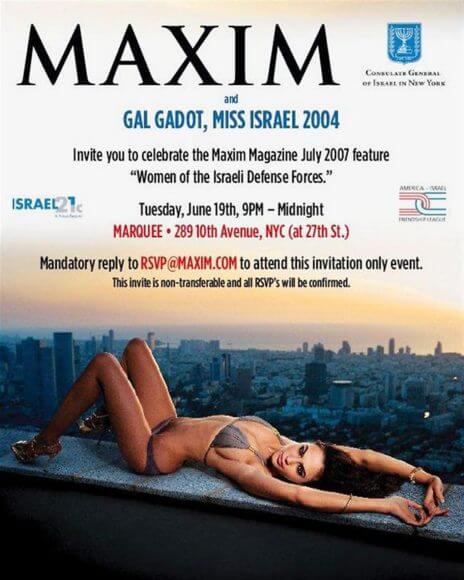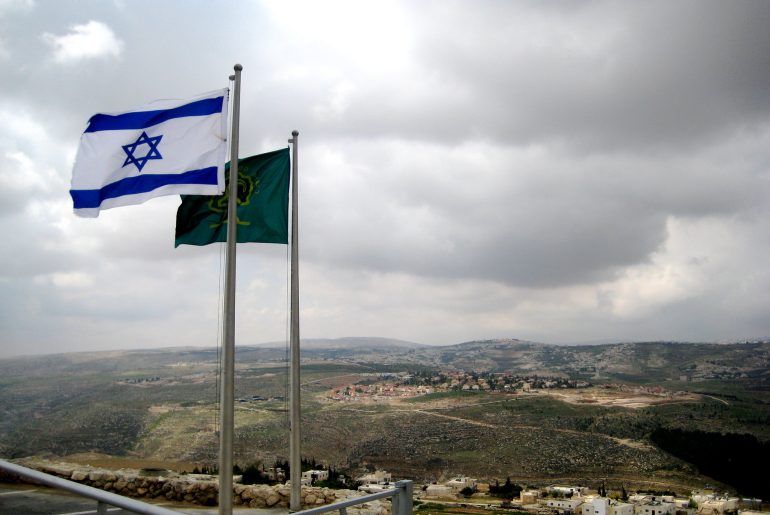On Wednesday, November 23, 2011 I published an op-ed in the NY Times, (Israel and ‘Pinkwashing’). This 900-word piece attempted to contextualize Pinkwashing. Here is a more detailed documentary history of Brand Israel, Israel’s campaign to re-brand itself in the minds of the world, as well as the development of pinkwashing as a funded, explicit, and deliberate marketing project within Brand Israel.
2005
According to the Jewish Daily Forward, in 2005 The Israeli Foreign Ministry, the Prime Minister’s Office and the Finance Ministry concluded three years of consultation with American marketing executives and launched “Brand Israel,” a campaign to “re-brand” the country’s image to appear “relevant and modern” instead of militaristic and religious.
“Americans don’t see Israel as being like the US,” explained David Sable, CEA and vice president of Wunderman, a division of Young and Rubicam that conducted extensive and costly branding research for Israel at no charge. His conclusion was that while Israel, as a brand, is strong in America, it is “better known than liked, and constrained by lack of relevance.” Sable elaborated, Americans “find Israel to be totally irrelevant to their lives and they are tuning out…particularly 18-34 year old males, the most significant target.” Brand Israel intended to change this by selecting aspects of Israeli society to highlight and bringing Americans directly to them. They started off with a free trip for architectural writers, and then another for food and wine writers. The goal of these “and numerous other efforts” was to convey an image of Israel “as a productive, vibrant and cutting-edge culture.”
In July 2005, The Brand Israel Group (BIG) presented their findings to the Israeli Foreign Ministry.
2006
In 2006, they conducted a study of Israelis’ own perceptions.
2007

In 2007, The Foreign Ministry organized a Brand Israel Conference in Tel Aviv, which marked the official adaptation of the campaign. Foreign Minister Tzipi Livni, appointed Ido Aharoni to head Israel’s first brand management office and awarded him a 4 million dollar budget, in addition to the already established 3 million in annual spending on Hasbara (Hebrew for “explanation” or propaganda) and 11 million for the Israeli Tourism Ministry in North America.
In 2007 Israel began its wooing of young males by first niche marketing to heterosexual men. David Saranga, of the Consulate General of Israel initiated a project with Maxim Magazine, a photo shoot entitled “Women of the Israeli Defense Forces” which shows model-like Israeli women who had served in the army, in swimsuits. Saranga said,
“Approaching Maxim allowed us to gear our message to the younger generation, especially males, and towards a demographic that did not see Israel as relevant or identify particularly with Israel.”
Follow up study revealed that Maxim’s readers’ perceptions of Israel had improved as a result of the piece. Saranga was pleased but knew he had a lot of work ahead of him.
“Rebranding a country can take 20 years or more. It involves more than just generating more positive stories about Israel. The process has to be internalized and integrated, too. Israelis must share in and believe in what we promote.”
In 2007, The Electronic Intifada reported that Saatchi and Saatchi was also working for Israel, free of charge. David Saranga told PR Week that the two groups Israel was targeting were “liberals,” and people aged 16 to 30. Gideon Meir of Israel’s Foreign Ministry told Haaretz that he would “rather have a Style section item on Israel than a front page story.”
2008
In 2008 Aharoni’s office hired TNS, a market research firm, to test new brand concepts for Israel in 13 different countries. They also funded a pilot program called “Israel: Innovation for Life” in Toronto. Aharoni predicted
“The execution of a program that will support the brand identity. This might include initiating press missions to Israel, or missions of community influentials; it could include organizing film festivals, or food and wine festivals featuring Israel-made products.”
This of course resulted in the “Spotlight Tel Aviv” program at the Toronto International Film Festival that caught the attention of John Greyson and Naomi Klein (left, the film Greyson removed from the festival in protest).
In 2008, PACBI published a sample contract that Israeli artists signed with their government when the artist was “invited” to an international event, the kind of “invitation” that every Israeli artists craves and must have in order to establish a broad reputation.
The contract text reveals, interestingly, that this is not an “invitation” at all, but rather that it is the Israeli government that is inviting itself to international events. The artist is paid with a plane ticket, shipping fees, hotel and expenses by his/her own government. The contract does not assume any funding from the “host” country. In return, the template states:
“The service provider is aware that the purpose of ordering services from him is to promote the policy interests of the state of Israel via culture and art including contributing to creating a positive image for Israel.”
Yet…
“The service provider will not present himself as an agent, emissary and/or representative of the Ministry.”
2009
The challenge facing Brand Israel was huge. In the 2009 EastWest Global Nation Brand Perception Index, Israel was 192 out of 200, behind North Korea, Cuba and Yemen and just before Sudan.
That year the International Gay and Lesbian Travel Association announced an October Conference in Tel Aviv with the goal of promoting Israel as a “world gay destination.” Helem, a Lebanese LGBTQ organization, responded with a call for a Boycott.
“For some time now, Israeli officials and organizations such as the Aguda, who are cooperating closely with IGLTA, have been promoting LGBT tourism to Israel through false representations of visiting Tel Aviv as not taking sides, or as being on the “LGBT” side, as if LGBT lives were the only ones that mattered. It is implied that it’s okay to visit Israel as long as you “believe in peace,” as if what is taking place in Palestine/Israel is merely a conflict between equals, rather than an oppressive power relationship. Consistent with globalization’s tendency to distance the “final product” from the moral implications of the manufacturing process, LGBT tourists are encouraged to forget about politics and just have fun in a so-called gay-friendly city…
Even more importantly, Tel-Aviv’s flashy coffee shops and shopping malls, in contrast with the nearby deprived Palestinian villages and towns, serve as evidence that the Israeli society, just as the Israeli state itself, has built walls, blockades and systems of racist segregations to hide from the Palestinians it oppresses. The intersection of physical and societal separations and barriers have justly earned the term apartheid, referring to an historically parallel racist regime in South Africa against the indigenous Black population of that country. Leisure tourism to apartheid Israel supports this regime. It is not neutral, and it certainly is not a step toward real peace, which can only be based on justice.”
The four-hour symposium took place despite opposition. In their newsletter the Travel Association acknowledged and dismissed the protest. Using Palestinians, from the beginning to whitewash Israeli violations of their rights.
“It has been fascinating to us that Tel Aviv has an Arab community living in peace here with the Jewish community,” said IGLTA President/CEOJohn Tanzella, who spoke about the 1,400-member association. “We are meeting gay business professionals from all religions and backgrounds within the Middle East.”
Protests at the event focused on Israeli occupation of Gaza. “They were using our gathering as a means to make their concerns public with all the radio and TV that came to meet us,” Tanzella said. “We certainly welcome freedom of speech, but it should be noted that our focus is to support LGBT businesses around the world, wherever they might be located.
That same year, the Zionist organization Stand With Us told The Jerusalem Post, that they were undertaking a campaign “to improve Israel’s image through the gay community in Israel.”
The Foreign Ministry told Ynet that they would be sponsoring a Gay Olympics delegation “to help show to the world Israel’s liberal and diverse face.”
2010
The January Conference of the Interdisciplinary Center Herzliya, The Lauder School of Government Diplomacy and Strategy and the Institute for Policy and Strategy brought together representatives of the Foreign Affairs Minstry, Haifa University, The Prime Minister’s Office, Reut Institute, and private communications companies to discuss: WINNING THE BATTLE OF THE NARRATIVE, reaffirming the need for re-branding.
The Conference had some very interesting findings:
– That many criticisms of Israel will stop when policy towards Palestinians is changed.
– Israel correlates with the terms “daring and independent” but not “fun and creative.
– 50% of people in western countries are disengaged and do not have an opinion on Israel, and can therefore be won over by marketing.
– “Narratives of victimhood and survival adapted by Israel over the years are no longer relevant for its diplomatic efforts and dialogue with the West. Nowadays Israel’s opponents capitalize on using the same narratives to achieve and mobilize support.”
– “People respond well when addressed in a familiar language that uses well-known terms and are susceptible to simple, repetitive, consistent messages.”
– “In order to succeed online, one has to detach one’s self from strictly official messages and to develop an online personality.”
By 2010, the Israeli Globe reported that The Ministry of Foreign Affairs had allocated 100 million Shekel (over $26,260,000) to branding.
“The Globe found that the activity will focus on the internet, especially on social networks. This is following research performed by the Ministry of Foreign Affairs in which it found that surfers will show sympathy and identity with content that interests them, regardless of the identity of the political affiliation of the publisher.”
Also in 2010, Scott Piro, a gay Jewish Public Relations/Social Media professional, announced in a press release on his letterhead that Israel’s Ministry of Tourism, The Tel Aviv Tourism Board and Israel’s largest LGBT organization, The Agudah, were joining together to launch TEL AVIV GAY VIBE, an online tourism campaign to promote Tel Aviv as a travel destination for European LGBTS.
“Campaign Branding Tel Aviv Gay Destination Underway”
July 21, 2010 Ynetnews.com
By Danny SadehWith an investment of NIS 340 million (about $88.1 million), an International marketing campaign is being launched to brand Tel Aviv as an international gay vacation destination. The campaign will be run in England and Germany, two locations with considerable gay and lesbian Communities.
The campaign will include ads on gay community websites and magazines and will display everything the city has to offer by way of gay tourism.
Designated Facebook and Twitter pages will be created to support the effort and promote Tel Aviv as a new gay capital.
A new website has also been built, Gay Tel Aviv. It starts off like with with a sentence encapsulating the very essence of the campaign: “Rising from the golden shores of the Mediterranean, stands one of the most intriguing and exciting new gay capitals of the world.”
The decision to brand Tel Aviv as an international gay destination was supported by an international study conducted by Outnow, a leading company for Consulting, branding and marketing to the gay community. The company was responsible for branding Berlin as the gay capital of Europe, a move that significantly increased tourism to the city.
Etti Gargir, director of the VisitTLV organization, said that the Tourism Ministry and Tel Aviv Municipality invested NIS 170 million (about $44 million) each in the project.
“The increased discount flight capacity from England and Germany increases the capability of Tel Aviv to compete with other cities in Europe. This is in addition to the Outnow study that found Tel Aviv to be an attractive city to those who like culture, restaurants, nightlife and shopping.
“The study also showed that the city is good for any budget. In other words, there is a range of entertainment and accommodation options at prices that anyone can afford,” said Gargir.
About a month ago, Tel Aviv Municipality submitted an official application to host the International Gay Pride Parade in 2012.
The Tourism Ministry reported that it supports targeted marketing campaigns likely to increase tourism to Israel.
The article was appended with the following comments from readers (verbatim):
- Surely nothing to be proud of. Shameful
- Haredim!!!!
- Gay avek also cute slogan (Yiddish for go away)
- Thanks for warning now I know not
- Yes by all means bring hordes of aids
- Inviting destruction full speed
Etc.
By 2010, “Pinkwashing” was already in general use by Queer anti-Occupation activists. The phrase was coined in 1985 by Breast Cancer Action to identify companies that claimed to support women with breast cancer while actually profiting from their illness. In April, 2010 QUIT (Queers Undermining Israeli Terrorism) in the Bay Area, used the phrase “Pinkwashing” as a twist on “Greenwashing” where companies claim to be eco-friendly in order to make profit. Dunya Alwan attributes the term to Ali Abunimah, editor of Electronic Intifada at a meeting in 2010 saying “We won’t put up with Israel Whitewashing, Greenwashing or Pinkwashing.”
In April 2010, Brand Israel launched Israeli Pride Month in San Francisco. Not a grassroots expression by Israeli queers living in San Francisco, but an event instigated, funded and administered by the Israeli government. QUIT – an actual queer organization- used “Pinkwashing” in their campaign to counter the cynical use by the Israeli government, through its “Brand Israel” re-marketing project to use the presence of LGBT society in Israel as “proof” of its commitment to human rights.
2011
By March 2011, Ynet reported that for the first time, The Israeli stand at the International Tourism Fair in Berlin, encourages gay tourists to visit Tel Aviv. According to Tel Aviv Council Member Yaniv Weizman, $94 million of Israeli government money was invested in 2010 in promoting gay tourism to Tel Aviv. The money came from the Tel Aviv Municipality and Tourism Ministry.
According to Weizman:
“The gay tourist likes urban vacations, he forms attachments with the community in the cities he visits, enjoys partying and usually returns to places he had a good time in. This is established tourism which draws in young tourism and sets trends which other sectors of the population adopt.”
The Tel Aviv Tourist Association filed a formal request with the International Gay and Lesbian Travel Association to host World Pride in 2012.
In July, The Anti-Defamation League hosted StandWithUS’s Yossi Herzog speaking on gay rights in Israel and gay presence in the Israeli Defense Force.
In August, the Jerusalem Post reported that :
The Foreign Ministry is promoting Gay Israel as part of its campaigns to break apart negative stereotypes many liberal Americans and Europeans have of Israel. The initiative flies in the face of the swelling protests set against Jerusalem’s Gay Pride parade set for November 10. But even as its organizers are receiving anonymous threats of holy war against them, gay activist Michael Hamel is traveling in Europe and North America working on publicizing Gay Israel. A portion of his work, he told the Jerusalem Post by phone as he sat drinking coffee in a California airport, has the support of the Foreign Ministry. “We are working very closely with them,” said Hamel, who heads the AGUDAH, Israel’s LGBT organization…
Speaking on condition of anonymity, a Foreign Ministry official told the Jerusalem Post this week that efforts to let European and American liberals know about the gay community in Israel were an important part of its work to highlight this country’s support of human rights and to underscore its diversity in a population that tends to judge Israel harshly, solely on its treatment of Palestinians. Still, it is a topic that is so touchy he did not want his name used. But David Saranga, who works in the New York consulate, was more open about the need to promote Gay Israel as part of showing liberal America that Israel is more than the place where Jesus once walked. The gay culture is an entryway to the liberal culture, he said, because in New York it is that culture that is creating “a buzz.” Israel needs to show this community that it is relevant to them by promoting gay tourism, gay artists and films. Showing young, liberal Americans that Israel also has a gay culture goes a long (way) towards informing them that Israel is a place that respects human rights, as well, said Saranga.
In Sum
Pinkwashing is the cynical use of queer people’s hard-won gains by the Israeli government in an attempt to re-brand themselves as progressive, while continuing to violate international law and the human rights of Palestinians.
1. Is Israel pro-Gay? LGBT people are included in obligatory military service in Israel. To the American eye, this could look “progressive.” The state supports events like the Tel Aviv LGBT Film Festival. There are enclaves of Tel Aviv where being out in your complete and daily life is possible, and some people are able to do this. However, overall, Israel is a profoundly homophobic society. The dominance of religious fundamentalists, the sexism and the proximity to family and family oppression makes like very difficult for most people on the LGBT spectrum in Israel.
According to Aeyal Gross, Professor of Law at Tel-Aviv University, “Gay rights have essentially become a public-relations tool” while “conservative and especially religious politicians remain fiercely homophobic.”
2. How Homophobic is Palestine? The Occupied Palestinian Territories are homophobic, sexist arenas. The goal of Pinkwashing is to justify Israel’s policies of Occupation and Separation by promoting the image of a lone oasis of progress surrounded by violent, homophobic Arabs- thereby denying the existence of a Queer Palestinian movements, or of secular, feminist, intellectual and queer Palestinians. By ignoring the multi-dimensionality of Palestinian society, the Israeli government is trying to claim racial supremacy that in their minds justifies the Occupation. Yet, nothing justifies the occupation. “While Palestinians in Israel, Jerusalem, and the Occupied Territories of the West Bank and Gaza constitute one community,” says Haneen Maikay, director of alQaws: For Sexual and Gender Diversity in Palestinian Society. “Our different legal statuses and the different realities of each of these locations – including, for example, restrictions on the freedom of movement of Palestinians from the West Bank and Gaza – severely constrain our ability to meet as a community.”
Why Queers Are Susceptible to Pink Washing
What makes LGBT people and their allies so susceptible to Homonationalism and Pinkwashing is the emotional legacy of homophobia. The vast majority of Queers have had profound oppression experiences, often in the searing realm of Family, reflected by the lack of legal rights, and reinforced by distorted representations in Arts and Entertainment. The relative civil equality of white gays in The Netherlands and Germany has only been achieved within a generation, and still does not erase the pain of familial and cultural exclusion. As a consequence, many people have come to mistakenly assess how advanced a country is by how it responds to homosexuality. Yet, in a selective democracy like Israel, the inclusion of LGBT Jews in the military, or the relative openness of Tel Aviv are not accurate measures of broad human rights. By deliberately Pinkwashing, the Israeli government ends up exploiting both the Israeli and Palestinian LGBT communities to cynically claim broad personal freedom that the on-going Occupation insistently belies.
A version of this post originally appeared at prettyqueer.com.
Sarah Schulman
Sarah Schulman is an American novelist, playwright, nonfiction writer, screenwriter, gay activist, and AIDS historian. She holds an endowed chair in Nonfiction at Northwestern University and is a Fellow at the New York Institute for the Humanities.




i wonder how much of that 26 million went towards developing online personalities.
that’s a lot of money.
Thank you, Sarah Schulman, for a deeply informative yet concisely written article. Excellent work.
It’s encouraging that the Pro-Palestine movement is gaining a lexicon with which we can dismantle the hasbara. The term ‘pinkwashing’. Hasbarists have been doing it for years, but now we can put a name to it.
There is also evidence of “Brown-Washing” efforts aimed at aligning Israel and American Jews with US Hispanics as fellow victims of oppression/discrimination:
http://www.jpost.com/LandedPages/PrintArticle.aspx?id=231283
http://www.forward.com/articles/143986/
Chutzpah is an understatement. These folks are shameless but also very, very good at what they do. I would like to see a similar history of the development of the Fundamentalist Christian/Israeli/AIPAC alliance (“Christ-Washing”?). I suspect that alliance was also instigated and developed along the same lines.
These alliances are scary because once the target group has drunk the kool-aid
they become true believers for the entire program (greater Israel, etc.).
IGLYO, the international LGBT youth organisation had planned their annual conference in Tel Aviv for December 2011, cooperating with the local IGY and accepting Israeli government money. Palestinian GLBT organisations asked for a boycott (PQBDS, last June). After some feet dragging, the conference was canceled because of “recent legal changes in Israel” (referring to the disallow-talking-about-BDS law).
(IGLYO)
When are they going to get that trying to rebrand apartheid is futile and temporary.